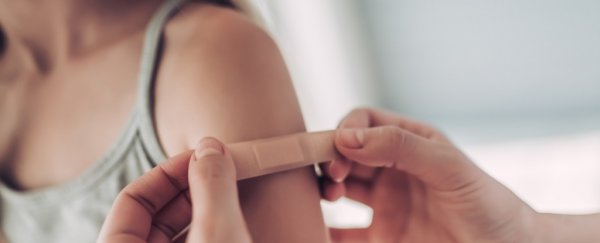It's been a little over a decade since the human papillomavirus (HPV) vaccine was introduced in the US, and already it's looking like a paragon of herd immunity.
Not only does this vaccine cut the risk of several cancers among those who are already vaccinated, it now appears to also protect women who have never even received the jab.
HPV is the most common sexually transmitted infection in the US, with approximately 80 percent of women having acquired some form of HPV by the age of 50.
But while most infections are brief, sometimes they can stick around and cause more serious issues, ranging from genital warts to cervical cancer.
Of all the cervical cancers diagnosed in the US each year, for example, no less than 91 percent are thought to be caused by an HPV infection.
Examining this infection among vaccinated and unvaccinated women, a new study has now revealed what a boon the HPV vaccine has truly been to public health.
Following nearly 1,600 young American women ages 13 to 26, the research tracked the rates of several HPV strains linked to cancers, starting just after the first HPV jab was introduced in 2006.
The results are exactly what public health experts were hoping. In the eleven years after the vaccine was introduced, HPV vaccination rates increased from zero to 84.3 percent.
What's more, among the impressive number of women who received the jab, HPV detection dropped from 35 percent to 6.7 percent, a plummet of around 80 percent.
"This shows that the vaccine is living up to its promise," says Amanda Dempsey, who has studied vaccination implementation issues for the last decade and now works at the University of Colorado.
Still, that's not all the vaccine has achieved.
When a high percentage of the population is vaccinated, infections like HPV can't bounce from person to person as easily, lowering the risk of contraction.
Ultimately, this bestows an extra layer of protection on the public, known to scientists as herd immunity.
In the US, this is exactly what the HPV vaccine appears to have done. Among young women who did not receive this vaccine, the researchers noticed that HPV detection dropped from 32.4 percent to 19.4 percent.
While the news is cause for celebration, none of this should make us complacent. Herd protection only works when everybody cooperates, so getting the HPV vaccine is still the best way of keeping this virus at bay.
"Don't rely on herd immunity," says Ina Park, an adviser to the American Sexual Health Association.
"The best way to ensure protection is to get vaccinated."
Today, public health experts recommend that all girls and boys be immunised starting at age 11 or 12. We should be doing this not only for ourselves, but for everyone around us.
This study has been published in Pediatrics.
